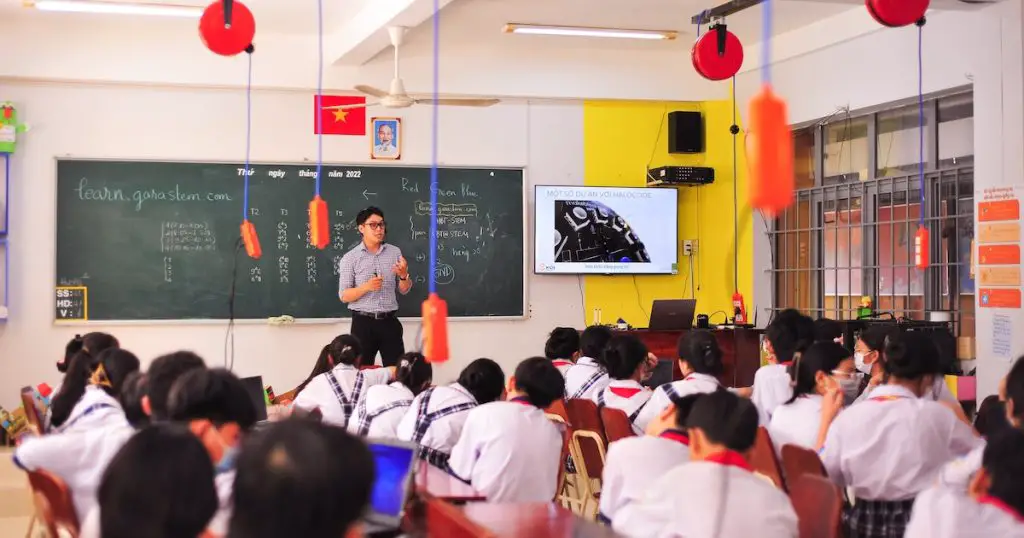Prescott, with its rich history and vibrant community, has long been a hub of education and learning. The role of Prescott’s education sector in its economy is pivotal, acting as a catalyst for regional development and prosperity.

The intertwined relationship between education and economic well-being is crucial, with education shaping the workforce and, in turn, impacting economic outputs. In this article, we delve into how this sector not only forms the backbone of the city’s societal framework but also how it significantly contributes to its economic fabric.
Overview of Prescott’s Education Sector
Prescott’s education sector is diverse and expansive, offering a plethora of opportunities for learning and development.
It’s a blend of tradition and innovation, and it’s crucial to understand its various components to fully comprehend its economic impact.
Elementary and Secondary Education in Prescott
The foundation of any robust education system is its primary and secondary institutions. Prescott’s elementary and secondary schools are renowned for their focus on holistic development and academic excellence. They emphasize not only cognitive learning but also social and emotional growth, preparing students for the multifaceted challenges of the future.
In Prescott, schools like the Prescott Unified School District are pillars of the community, fostering a conducive learning environment. They play a crucial role in molding young minds and nurturing talents, equipping students with the necessary skills and knowledge to contribute meaningfully to society and the economy.
Higher Education Institutions in Prescott
Higher education in Prescott is marked by diversity and quality, offering a range of programs and disciplines. Institutions like Prescott College and Yavapai College have earned reputations for their rigorous academic programs and commitment to student success.
Prescott College, known for its liberal arts education, encourages students to explore and understand interdisciplinary concepts, paving the way for innovative thinking and problem-solving. Meanwhile, Yavapai College provides a range of vocational and technical programs, ensuring that students have diverse career paths to choose from.
Vocational and Technical Education
Vocational and technical education in Prescott is a vital component of the education sector. It offers practical skills and knowledge, enabling students to pursue specialized careers and contribute directly to the local economy.
These institutions and programs are tailored to meet the demands of the job market, ensuring that students are well-equipped to navigate the professional landscape. They also play a pivotal role in addressing skills gaps and fostering a competent and versatile workforce capable of adapting to the evolving needs of the industry.
Economic Impacts of Education
The Economic Impacts of Education are extensive and pivotal, reaching far beyond the realms of academia into the broader socio-economic landscape. Education is not merely a conduit for knowledge and skills acquisition but is a substantial economic driver.
It directly contributes to economic growth by creating employment opportunities within educational institutions and related sectors.
Indirectly, it is the cornerstone for a skilled and knowledgeable workforce, which is instrumental in enhancing productivity, fostering innovation, and boosting economic competitiveness.
By promoting social mobility and individual financial stability, education acts as an equalizer, alleviating economic disparities and fostering inclusive growth. The multifaceted economic implications of education underscore its role as a foundational pillar for sustainable economic development and societal prosperity.

Direct Economic Contributions
The education sector is a significant employer and revenue generator in Prescott. It provides numerous employment opportunities, from academic positions to administrative roles, contributing to the overall economic activity in the region.
The revenue generated by educational institutions through tuition fees, grants, and other sources is substantial. This financial inflow supports local businesses and services, creating a multiplier effect throughout the local economy. Studies have shown that investments in education correlate strongly with economic growth, highlighting the sector’s pivotal role in economic development.
Indirect Economic Contributions
Beyond the tangible financial contributions, the education sector also facilitates skill development, innovation, and entrepreneurship. It molds individuals into informed, competent citizens capable of contributing to societal progress.
The creation and dissemination of knowledge within educational institutions foster an environment conducive to innovation and entrepreneurship. This atmosphere nurtures creative thinking and problem-solving skills, essential components for the establishment and success of new ventures.
Comparative Economic Analysis
Comparative Economic Analysis in the context of education involves scrutinizing the educational and economic landscapes of different regions to discern patterns, strengths, and areas for improvement. This analysis provides insights into how variations in educational investments, policies, and practices correlate with economic outcomes such as employment, income levels, and overall economic growth.
It offers a comprehensive perspective on the efficacy of educational systems and their consequential impact on economic development.
By understanding the interrelations between education and economy across different regions, policymakers and educators can implement informed strategies to optimize both educational experiences and economic benefits, fostering a harmonious co-evolution of education and economy.
Comparative Analysis with Other Cities
When we compare the educational attainment and economic performance of Prescott with other cities, it stands out for its robust education system and diverse economic landscape. The city’s education sector is a driving force behind its economic resilience and adaptability.
Cities with strong education sectors tend to have more dynamic economies, marked by innovation and a high quality of life. In this regard, Prescott’s emphasis on education reflects its commitment to sustainable, inclusive economic development.
Impact on Local Businesses and Industries
The education sector in Prescott significantly influences local businesses and industries by supplying skilled labor and fostering partnerships. A well-educated workforce is a boon to any economy, leading to increased productivity and innovation.
The synergy between businesses and educational institutions in Prescott is noteworthy. Through collaborations and partnerships, they co-create value, enriching the learning experience for students while addressing the evolving needs of the industry.
Government Policies and Initiatives
Government Policies and Initiatives play a paramount role in shaping the trajectory of the education sector and establishing the structural framework that guides its development and functionality. Through meticulous policy formulation and strategic initiatives, governments determine the quality, accessibility, and innovation within the educational ecosystem.
These policies and initiatives act as the catalysts that drive educational reforms, ensuring the alignment of educational objectives with societal needs and economic goals.
By investing in education and fostering an environment conducive to learning and development, governments empower individuals, strengthen communities, and fuel economic progression, laying down the foundations for a prosperous and enlightened society.

Government’s Role in Education
Government policies and initiatives are integral to the functioning and development of Prescott’s education sector. They determine the availability of resources, the quality of education, and the overall direction of educational development in the region.
The government’s investment in education is reflected in the quality and diversity of educational institutions in Prescott. Through policy formulation and implementation, the government ensures that education remains accessible and equitable, contributing to the overall well-being and development of the region.
Initiatives for Educational Improvement
The government has undertaken various initiatives to enhance the quality of education in Prescott. Investments in infrastructure, educational programs, and grants are testimony to its commitment to educational excellence.
These initiatives are aimed at addressing the existing challenges in the education sector while paving the way for future growth and development. They signify the government’s resolve to leverage education as a tool for social and economic transformation.
Challenges and Opportunities
Challenges and Opportunities often go hand-in-hand in any sector, acting as the dual forces that drive evolution and innovation. In the realm of education, challenges such as limited resources, accessibility, and quality assurance necessitate inventive solutions and strategic approaches.
These challenges, while posing significant hurdles, open doors to a myriad of opportunities like the integration of technology, the development of inclusive education models, and the creation of collaborative learning environments.
By addressing the challenges head-on, educators, policymakers, and communities can harness the opportunities to reshape the educational landscape, fostering a system that is more equitable, responsive, and impactful, ultimately contributing to societal advancement and economic growth.
Challenges in Prescott’s Education Sector
Funding limitations and issues related to quality and accessibility are some of the main challenges faced by Prescott’s education sector. These challenges necessitate innovative solutions and concerted efforts from all stakeholders to ensure the sector’s sustainability and growth.
Addressing these challenges is crucial for maintaining the high standards of education in Prescott and ensuring that it continues to contribute significantly to the local economy. It requires a holistic approach, encompassing policy reforms, community engagement, and resource optimization.
Opportunities and Potential Growth Areas
The challenges faced by Prescott’s education sector also unveil opportunities for growth and innovation. Technological integration and collaborative learning are areas with immense potential to transform the education landscape in Prescott.
Embracing these opportunities can lead to the development of more inclusive and effective educational models, enhancing the overall learning experience. They also hold the promise of fostering a more equitable and resilient education sector, capable of adapting to the changing needs of society and the economy.
The Interplay Between Education and the Economy
The interplay between education and the economy is a dynamic and multifaceted relationship, pivotal to the development and progress of any society. Education serves as the backbone of economic development, shaping the workforce, fostering innovation, and driving productivity.
It equips individuals with the knowledge, skills, and values needed to navigate and contribute to the economic landscape effectively. In turn, a thriving economy supports and sustains a robust education system by allocating resources and creating opportunities.
This symbiotic relationship is crucial in building resilient, prosperous societies where education and economic growth mutually reinforce each other, creating a cycle of sustained development and progress.
Quantitative Relationship
A statistical analysis of education’s impact on the economy is crucial for understanding its significance in economic development. Data-driven insights reveal how educational attainment and investment correlate with economic outputs and productivity.
The quantitative relationship between education and the economy manifests in various ways, including higher income levels, lower unemployment rates, and increased economic activity. By examining specific case studies, we can discern the nuanced ways in which educational initiatives and reforms translate into economic gains and societal benefits.
Qualitative Relationship
Beyond numbers, the qualitative impacts of education on individuals and communities are profound. It shapes societal values, norms, and the overall quality of life in Prescott. It acts as a catalyst for individual empowerment and community development, fostering a sense of civic responsibility and social cohesion.
The influence of education on societal values and norms is evident in the way it fosters a culture of inclusivity, tolerance, and mutual respect. It plays a pivotal role in shaping the character and ethos of a community, creating a conducive environment for social harmony and collaborative progress.
Future Prospects
By examining evolving educational trends and Prescott’s economic outlook, we can foresee how the education sector will shape the city’s future.
Emerging educational models and technological advancements are expected to play a pivotal role in this regard.
Evolving Educational Trends
The education sector in Prescott is poised for transformation with the advent of new educational models and technological integration. These developments are set to redefine the learning experience, making education more accessible, engaging, and relevant.
Innovations in teaching methodologies, curriculum design, and learning tools are paving the way for a more inclusive and holistic education system. The role of technology, in particular, is instrumental in bridging gaps and expanding the reach of education, ensuring that learning transcends traditional boundaries and adapts to the needs of a diverse student population.
Economic Outlook for Prescott
Prescott’s economic future looks promising, with education playing a crucial role in driving growth and sustainability. The education sector’s influence on future economic trends is substantial, acting as a catalyst for innovation and enterprise.

The ongoing investments in education and the synergies between educational institutions and local industries are expected to fuel economic development. The emphasis on skill development and knowledge dissemination will contribute to the creation of a robust, dynamic workforce, bolstering the city’s economic resilience and competitiveness.
Case Studies
Examining specific instances of success and impactful initiatives provides tangible insights into the transformative power of education in Prescott.
These stories exemplify how educational institutions and programs can bring about positive change and drive community development.
Success Stories of Educational Institutions
Prescott College and Yavapai College are prime examples of the positive impact educational institutions can have on a community and its economy. Their commitment to academic excellence, community engagement, and innovation has contributed significantly to Prescott’s socio-economic development.
The success stories of Prescott College demonstrate the transformative power of education, showcasing how it can empower individuals and communities. Similarly, Yavapai College’s diverse programs and community-centric approach have played a vital role in shaping the local economy and fostering a culture of learning and growth.
Impactful Initiatives and Programs
Several innovative programs and community outreach initiatives in Prescott stand as a testament to the transformative power of education. These initiatives are designed to address specific needs and challenges, contributing to societal well-being and economic prosperity.
Such programs not only enhance the learning experience but also foster a sense of community and mutual responsibility. They serve as catalysts for change, driving social and economic development by empowering individuals and facilitating community engagement.
FAQs: Role of Prescott’s Education Sector in its Economy
In this section, we will be delving into some of the most common inquiries and curiosities that surround our topic.
How does Prescott’s education sector compare to neighboring cities in terms of economic contribution?
Prescott’s education sector is a significant economic driver, offering a unique mix of institutions and fostering notable synergies with local businesses, thus standing out in terms of economic contribution compared to its neighboring cities by promoting employment, innovation, and skill development.
What are the main challenges faced by educational institutions in Prescott?
Educational institutions in Prescott grapple with challenges such as limited funding and accessibility, which affect the quality and reach of education. Addressing these challenges is crucial for ensuring equitable educational opportunities and maintaining high educational standards in the region.
Are there any upcoming educational initiatives or reforms in Prescott?
While this article does not specify upcoming initiatives or reforms, it is essential to stay informed about local educational developments, as new initiatives and reforms are continually being developed to enhance the quality, accessibility, and impact of education in Prescott.
How does the education sector impact the overall quality of life in Prescott?
The education sector significantly enhances the quality of life in Prescott by fostering a knowledgeable, skilled, and civically engaged populace. It contributes to individual empowerment, social cohesion, and economic prosperity, creating a conducive environment for personal and communal growth.
Conclusion
In conclusion, the role of Prescott’s education sector in its economy is multifaceted and profound. It serves as the foundation upon which the societal and economic framework of the city is built. The symbiotic relationship between education and economic well-being is evident in Prescott’s commitment to educational excellence and its impact on economic development and societal progress.
From fostering individual empowerment to driving innovation and entrepreneurship, education is a pivotal force in shaping the future of Prescott. The resilience, adaptability, and forward-thinking approach of Prescott’s education sector are indeed empowering prosperity and paving the way for a bright, inclusive future.



Leave a Comment
You must be logged in to post a comment.